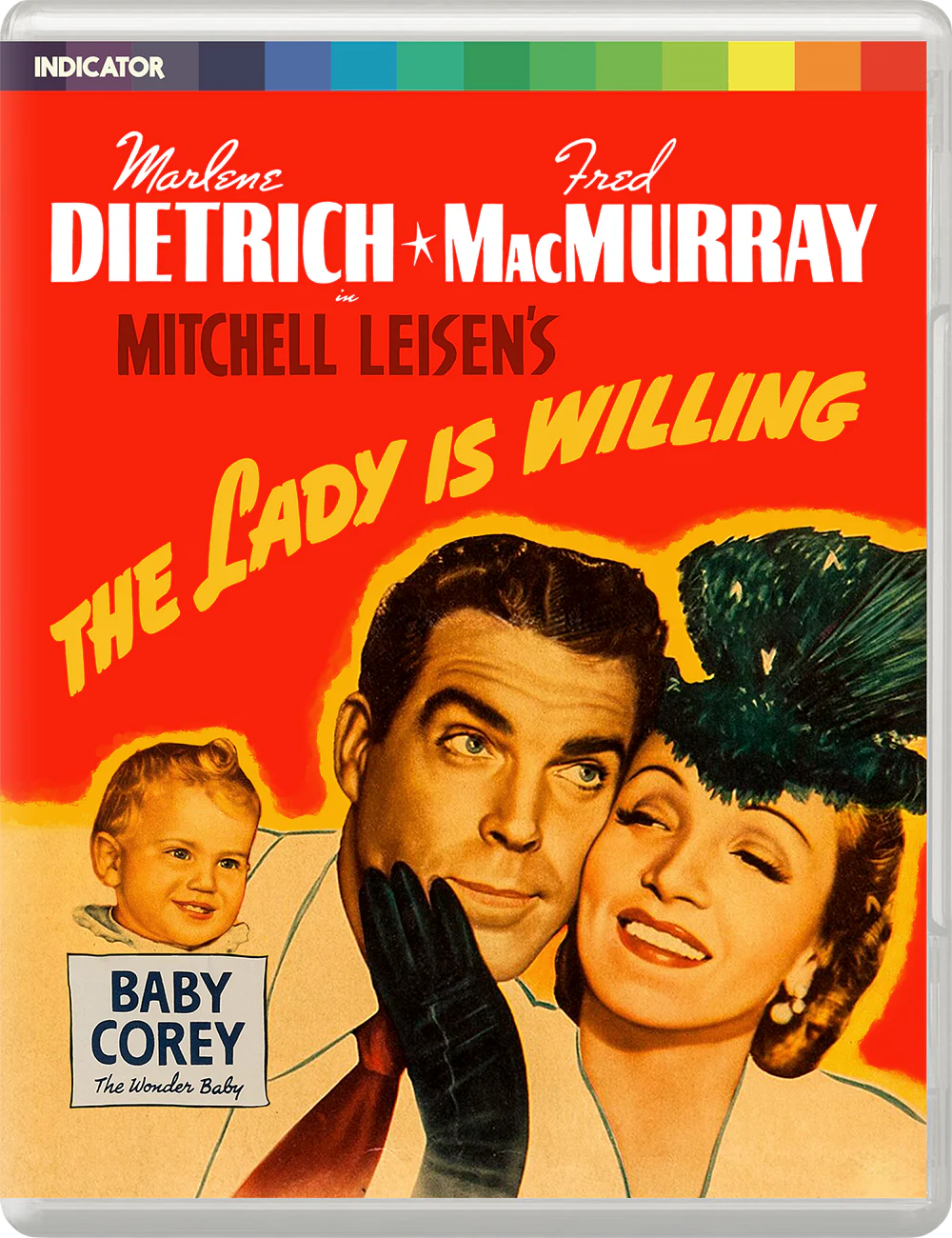|
The Film

Hollywood legends Marlene Dietrich (Blonde Venus) and Fred MacMurray (Pushover) collide in the screwball comedy classic The Lady Is Willing.
Eccentric Broadway star Liza Madden (Dietrich) longs to become a mother but has no need for a husband. When she stumbles across an abandoned baby, she resolves to adopt it, entering into a marriage of convenience with child-hating, rabbit-obsessed divorcé Dr McBain (MacMurray).
Directed by Mitchell Leisen (Remember the Night) and scripted by James Edward Grant (Bullfighter and the Lady), The Lady Is Willing also includes memorable supporting turns from Stanley Ridges (An Act of Murder), Aline MacMahon (One Way Passage), and Arline Judge (An American Tragedy).
Video
Solid screwball comedy that is very agreeable and entertaining for most of it's length as Broadway star Marlene Dietrich and Obstetrician Andy MacMurray navigate marriage, an adopted baby and other shenanigans. However, the last aft of the film suddenly lurches into serious drama which damages the film. Still, good overall.
From the booklet:The Lady Is Willing was sourced from Sony’s HD remaster. The film’s original mono soundtrack was remastered at the same time. Sony generally have n excellent reputation for producing top notch restorations and masters. The Lady is Willing is another fine example with plentiful fine grain as befitting a film lensed photochemically in 35mm monochrome. There's a softness to the film that I suspect was part of the original cinematography which is very solid, professional and ensures that everything is clear to see. It's not the kind of cinematography that will win the Oscar which is not to say it's dull looking just a pretty standard look for a screwball comedy drama of the period. Optical transitions are slightly softer as well shots of Dietrich on occasion, the former due to how films were assembled in the photochemical era, the later because Dietrich is a glamorous female superstar of the period and directors of photography in the Golden Age tried to make the leading ladies look extra soft and glamorous!
Detail is strong in closeups and medium shots, softer in long shots. Shadow detail is generally fine although there is some mild crush albeit most likely intended. The image has a lovely contrast ratio allowing highlights to shine. Much of the film is indoors under controlled lighting conditions so there's a certain chiaroscuro effect to much of the cinematography. The B&W has no gamma pushes, pure monochrome. I didn't spot a single speckle or sign of damage or age in the transfer. The encode is superb, handling grain and density changes well.
The only caveat is that there's an odd anomaly at around 70 minutes where the image lurches, right after Dietrich throws a towel at her two employees. The employees jump as if frames are missing. It's fleeting and I didn't see any other issues.
The film looks as good as it's possible to look shy of 4K and HDR and even then I suspect the improvements would be relatively minor ('A')
1080p24 / AVC MPEG-4 / BD50 / 1.37:1 / 90:39
Audio
English LPCM 1.0 (48kHz, 24-bits)
Subtitles: English HoH
Soundtracks of the '40s were mono; Fantasia in 1940 was, as far as I'm aware, the first film to have multichannel sound. The Lady is Willing has a solid mono track that emphasises dialogue and score, both of which don't trample over each other maintaining narrative clarity. Sound design is straightforward although there is some noticeable hiss, even at normal volume levels. Nothing too distracting though bur par for the course. It's not the most robust mono track in a '40s film I've heard but neither will fans have an issues. Hard of hearing subs are typically meticulous catching all nuance in the dialogue ('B-')
Extras
Audio commentary with film historian Adrian Martin (2024)
Australian film critic Martin has done lots of these tracks and approaches the film as a big fan of director Leisen and his unusual approach to the opening credits: printed in a book and the pages are turned live, no optical transitions here. He has a relaxed quality to his delivery which is highly listenable. He covers the cast and crew and the actual production in fair detail. Presented in lossy English Dolby Digital 2.0 mono (48kHz, 192Kbps).
"Performance of Innocence: Richard Dyer on The Lady is Willing" 2024 interview (26:24)
Dyer is Professor Emeritus at King's College London and takes a dive into the career of Marlene Dietrich in this fine interview that also discusses how Dietrich wasn't usually in screwball comedies a very American genre, the theatricality of Leisen's style. Presented in 1080p24 1.78:1 with lossy English Dolby Digital 2.0 stereo (48kHz, 192kbps)
"Lux Radio Theatre: The Lady is Willing" 1943 radio episode (51:26)
A vintage radio episode which has the usual very canned sound but is eminently listenable. Presented in lossy English Dolby Digital 2.0 mono (48kHz, 192Kbps).
The Lady is Willing Image Gallery: Original Promotional Material (71 images)
Solid HD gallery of studio publicity shots, always a great little extra.
36-page liner notes booklet with a new essay by Iris Veysey, an archival interview with Marlene Dietrich, an archival profile of director Mitchell Leisen, an overview of contemporary critical responses and film credits
We have an excellent new essay by Veysey which which covers the making of the film and the fact Dietrich had broken her leg during filming and how they shot around it, alternate versions of the film and how the film wasn't entirely embraced by the critical fraternity at the time. The vintage interview is interesting as are the critical responses in more detail.
Packaging
Not sent for review.
Overall
Another Hollywood classic from the Golden Age gets a lovely transfer, top notch encode ensuring the decent image and sound are well represented. Extras are strong and engrossing, supportive of the film and adding excellent contextual added value. Highly recommended ('A-').
| The Film: B |
Video: A |
Audio: B- |
Extras: A |
Overall: A- |
|

